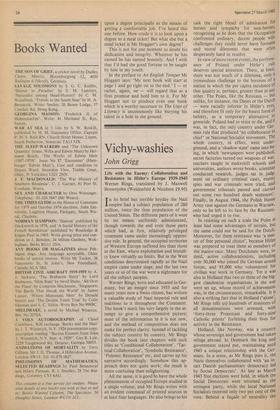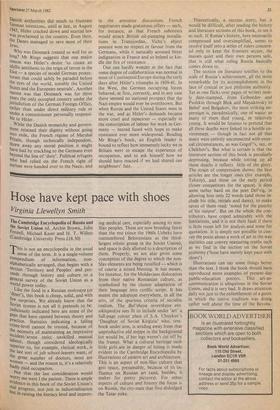Vichy-washies
John Grigg
Life with the Enemy: Collaboration and Resistance in Hitler's Europe 1939-1945 Werner Rings, translated by J. Maxwell Brownjohn (Weidenfeld & Nicolson £9.95) In its brief but terrible heyday the Nazi empire had a subject population of 260 million, twice the then population of the United States. The different parts of it were by no means uniformly administered, though towards the end even those parts which had, at first, relatively privileged treatment came under increasingly oppres- sive rule. In general, the occupied territories of Western Europe suffered less than those in the East, where exploitation and brutali- ty knew virtually no limits. But in the West conditions deteriorated rapidly as the Nazi empire came under siege, and the last two years or so of the war were a nightmare for all the subject peoples.
Werner Rings, born and educated in Ger- many, but an emigre since 1933 and for many years now a Swiss citizen, has written a valuable study of Nazi imperial rule and reactions to it throughout the Continent. The book's merit lies very largely in the at- tempt to give a comprehensive picture; most of the information in it is not new, and the method of composition does not make for perfect clarity. Instead of tackling the subject country by country, Mr Rings divides the book into chapters with such titles as 'Conditional Collaboration', 'Tac- tical Collaboration', 'Symbolic Resistance', 'Polemic Resistance' etc, and carves up his narrative accordingly. Somehow this ap- proach does not quite work; the result is more confusing than enlightening.
All the same, it is good to have the whole phenomenon of occupied Europe studied in a single volume, and Mr Rings writes with an evident command of printed sources in at least four languages. He also brings to his
task the right blend of admiration for heroes and sympathy for non-heroes, recognising as he does that the Occupation confronted ordinary, decent people with challenges they could never have foreseen and moral dilemmas that were often desperately hard to resolve.
In view of more recent events, the perform- ance of Poland under Hitler's rule deserves special attention. There, at least, there was not much of a dilemma; only a tremendous challenge to the heroism of a nation in which the per capita incidence of that qualtiy is, perhaps, greater than in anY other. The Poles, like the Russians — but unlike, for instance, the Danes or the Dutch — were racially inferior in Hitler's eyes, and therefore fit only for the basest form of helotry, as a temporary alternative to genocide. Poland had to resist or die, and it was, in fact, the only country under Ger- man rule that produced 'no collaborator In chief' or National Socialist movement. The whole country, in effect, went under- ground, and a 'shadow state' came into be- ing, in which 'newspapers were published, secret factories turned out weapons of war, teachers taught in makeshift schools and universities, authors wrote books, scientists conducted research, judges sat in judg- ment on ordinary criminal cases, enemY spies and war criminals were tried, and government tribunals passed and carried out some two hundred death sentences'. Finally, in August 1944, the Polish Home Army rose against the Germans in Warsaw, only to be left to its fate by the Russians, who had urged it to rise.
In resisting on such a scale the Poles at least had some advantages of terrain, but the same could not be said for the Dutch. Moreover, for them resistance was 'a mat- ter of free personal choice', because Hitler was prepared to treat them as members of the master-race. Many Dutchmen were, in- deed, active collaborationists, including over 50,000 who joined the German armed forces, and 93,000 who volunteered for civilian war work in Germany. Yet it was also in Holland that two or three of the big- gest clandestine organisations in the war were set up, whose record of achievement was, in the circumstances, remarkable. It is also a striking fact that in Holland ('alone', Mr Rings tells us) hundreds of ministers of all denominations were arrested, with 'forty-three Protestant and forty-nine Catholic priests' forfeiting their lives for activity in the Resistance.
Holland, like Norway, was a country whose sovereign and government had taken refuge abroad. In Denmark the king and government stayed put, maintaining until 1943 a unique relationship with the Ger- mans. In a sense, as Mr Rings puts it, the Nazis themselves collaborated with 'an in- tact Danish parliamentary democracy led by Social Democrats'. As late as March 1943 free elections were held, in which the Social Democrats were returned as the strongest party, while the local National Socialists received only two per cent of the vote. Behind a façade of neutrality the Danish authorities did much to frustrate German intentions, until at last, in August 1943, Hitler cracked down and martial law was proclaimed in the country. Even then, the Danes managed to save most of their Jews.
, Why was Denmark treated so well for so long? Mr Rings suggests that one major reason was Hitler's desire `to create an idyllic antithesis to the reign of terror in the East — a species of model German protec- torate that could safely be paraded before the eyes of the world, notably the United States and the European neutrals'. Another reason was that Denmark was for three years the only occupied country under the Jurisdiction of the German Foreign Office, rather than under direct military rule or under a commissioner personally responsi- ble to Hitler.
While the Danish monarchy and govern- ment retained their dignity without going into exile, the French regime of Marshal Fetain, though technically independent, threw away any moral position it might have had by truckling to the Germans even beyond the line of 'duty'. Political refugees who had relied on the French right of asylum were handed over to the Nazis, and in the armistice discussions French negotiators made gratuitous offers — such, for instance, as that French saboteurs would attack British oil-pumping installa- tions in Transjordan. Vichy's abject posture won no respect or favour from the Germans, while it naturally aroused bitter indignation in France and so helped to kin- dle the fire of resistance.
One can hardly wonder at the fact that some degree of collaboration was normal in most of Continental Europe during the early days after Hitler's triumphs in 1939-41. In the West, the German occupying forces behaved, at first, correctly, and in any case there seemed no national prospect that the Nazi empire would ever be overthrown. But when Russia and the United States were in the war, and as Hitler's demands became more cruel and rapacious — especially in the conscription of labour for work in Ger- many — hatred fused with hope to make resistance ever more widespread. Reading Mr Rings's book, an English reader is bound to reflect how immensely lucky we in Britain were to escape the experience of occupation, and to ask himself how we should have reacted if we had shared our neighbours' fate.





































 Previous page
Previous page